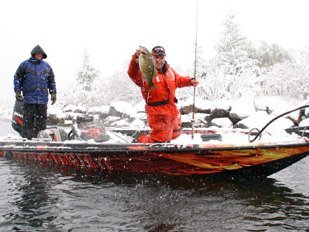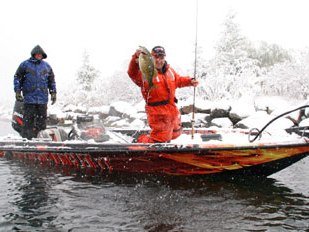 As summer draws to a close and the temperatures begin to drop with the onset of autumn, so begins the transition into new techniques and approaches when it comes to fishing. That first morning when you feel the crunch of frost beneath your feet and add an extra layer of clothing brings with it changes in the behavior and activity of the fish you're heading out to catch.
As summer draws to a close and the temperatures begin to drop with the onset of autumn, so begins the transition into new techniques and approaches when it comes to fishing. That first morning when you feel the crunch of frost beneath your feet and add an extra layer of clothing brings with it changes in the behavior and activity of the fish you're heading out to catch.
The main aspect of fishing during the chilly autumn months is the fact that the fish will not act the same as they did during spring and summer. This is because fish are cold-blooded and, as water temperatures decrease, so will their level of activity, which will require that you use different tackle, as well as different presentations.
As the temperature drops, fish metabolism slows down, which causes them to feed less in an effort to conserve energy that they would otherwise exhaust chasing prey. What you'll need to do as this happens is switch to smaller lures and start implementing steadier retrieves. Downsizing lures will appeal to lethargic fish's desire for an easy meal, along with slow, constant retrieves, rather than jerky, sudden movements. A good example of this is the typical tackle and techniques utilized by ice fishermen: very small lures vertically jigged in one spot.
There are also occasions where such freezing water temperatures can wreak havoc on your line, even causing ice to build up and impair the performance of your gear. Copolymer lines, which is basically a monofilament line coated with fluorocarbon, resist freezing exceptionally well, along with high-quality monofilaments such as P-Line's CXX. Those who utilize braided lines will want to switch to such durable monofilaments and copolymers, due to braided line's tendency to hold water, thus freezing quickly. You can also treat your line with sprays like Line and Lure, which was developed and endorsed by Kevin Van Dam himself. This water-based conditioner will actually allow you to rid your line of icy build up by simply flicking it.
While changing your style and tackle slightly is very important during the colder seasons, equipping yourself with proper clothing will go a long way towards ensuring your day on the water is a comfortable one. After all, fumbling with hooks and tying knots with numb, shivering fingers will ruin a day almost as fast as falling into frigid water. I find that a warm pair of wool or fleece fingerless gloves helps a lot. Not only do they keep your hands warm but the fingerless tips allow you to effectively work with small, delicate items without having to remove the gloves completely. Furthermore, keeping a hand warmer in your coat pocket and wearing wool socks aren't bad ideas either.
Generally, cold weather common sense and remembering that the habits of fish can change drastically, even when the temperature drops only a few degrees, let alone plummet into downright freezing will be all you'll need. Following a few simple rules and being patient will go a long way to turning a cold day into a hot streak on the water!








